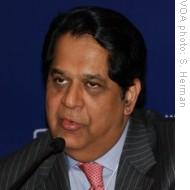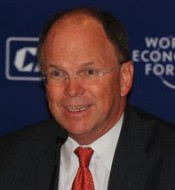-
(单词翻译:双击或拖选)
While India's economy, greatly driven by domestic demand, is sheltered compared to the losses being seen in economies more dependent on exports, there is some fear and uncertainty1 among the country's business leaders.
 |
| K.V. Kamath, C.E.O of ICICI Bank & president, Confederation of Indian IndustryWorld Economic Forum2, Taj Palace Hotel, 16 Nov. 2008 |
After the leaders of developed nations - the so-called G-20 group - failed to agree on a coordinated3 economic-stimulus plan during a meeting in Washington, corporate4 and government leaders in New Delhi gathered to assess India's financial situation.
Leading banker and President of the Confederation of Indian Industry K.V. Kamath says corporate bosses are still trying to digest the ramifications5 of the global credit crisis and economic meltdown.
"It will take six to eight weeks for industry to really figure out there is an impact, but what is that impact and what ought to be our response," Kamath said. "And I think thereafter it will be a major response."
Various forecasts predict India will see a few percentage points shaved off its average annual nine-percent growth rate of the last several years.
James Quigley, the chief executive officer of the global consulting firm Deloitte, says India's growth forecast is the envy of many of those G-20 countries.
 |
| Deloitte global chief and C.E.O James Quigley, World Economic Forum, Taj Palace Hotel, 16 Nov. 2008 |
"There is a whole bunch of other leaders in Washington right now thinking about six percent would be quite fantastic, would be wonderful, would be unprecedented6, if they could enjoy that kind of growth," Quigley said.
But the chairman of the India-based information technology consultancy Satyam Computer Services, B. Ramalinga Raju, does not believe the current predicted growth is adequate to sustain India's 1.2 billion people, most of them still mired7 in poverty.
"A six or seven percent growth may be not good enough for a developing country," Raju said.
There are fears among many of those attending the annual India summit of the World Economic Forum that the global financial crisis will usher8 in an era of trade protectionism.
 |
| Rahul Bajaj, chairman, Bajaj AutoWorld Economic Forum, Taj Palace Hotel, 16 Nov. 2008 |
The chairman of a vehicle manufacturer, Rahul Bajaj, who is also a member of Parliament, is making a plea for that not to happen.
"All of us, and especially the developed world, should not now go in for protectionism," Bajaj said. "We know that at times like this voices are raised and the 'beggar-thy-neighbor' policy comes into effect."
There are numerous other storm clouds on the horizon for India's economy. More than $11 billion was withdrawn9 by foreign investors10 from Indian markets in the first nine months of this year. As in many other countries, lending for real estate and other investments has vaporized. And many major Indian and foreign companies here have been announcing significant job cuts.
 收听单词发音
收听单词发音
1
uncertainty

|
|
| n.易变,靠不住,不确知,不确定的事物 | |
参考例句: |
|
|
|
2
forum

|
|
| n.论坛,讨论会 | |
参考例句: |
|
|
|
3
coordinated

|
|
| adj.协调的 | |
参考例句: |
|
|
|
4
corporate

|
|
| adj.共同的,全体的;公司的,企业的 | |
参考例句: |
|
|
|
5
ramifications

|
|
| n.结果,后果( ramification的名词复数 ) | |
参考例句: |
|
|
|
6
unprecedented

|
|
| adj.无前例的,新奇的 | |
参考例句: |
|
|
|
7
mired

|
|
| abbr.microreciprocal degree 迈尔德(色温单位)v.深陷( mire的过去式和过去分词 ) | |
参考例句: |
|
|
|
8
usher

|
|
| n.带位员,招待员;vt.引导,护送;vi.做招待,担任引座员 | |
参考例句: |
|
|
|
9
withdrawn

|
|
| vt.收回;使退出;vi.撤退,退出 | |
参考例句: |
|
|
|
10
investors

|
|
| n.投资者,出资者( investor的名词复数 ) | |
参考例句: |
|
|
|















